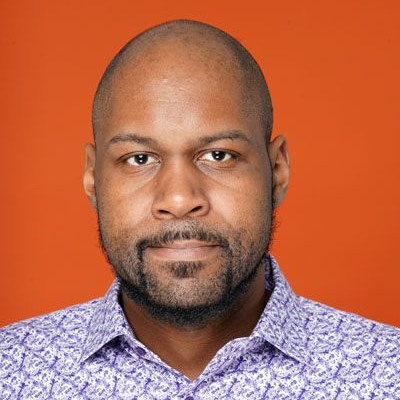Jason Steer immediately rattles off the heap of successful programming at the Creative Alliance, a mixed-space gallery and venue in the historic Patterson Theater in the racially diverse Patterson Park neighborhood.
“We are known for our diversity — even before it became a title or a thing,” Steer says. “All are welcome. That has been in our genetics.”
But museums and the arts, including in Baltimore and across Maryland, have become battlegrounds over efforts to address gender and racial discrimination and inequity.
This week, President Donald Trump signed an executive order to eliminate “divisive race-centered ideology” in an overhaul to the storied Smithsonian Institution‘s museums, educational and research centers based in the nation’s capital. Trump has also targeted the Kennedy Center in Washington, barring drag performances and eliminating efforts to reach marginalized communities and commission work by Black composers.
Read More
In response, leaders in those spaces point out the benefits of their diverse programs, saying they are essential to create robust and authentic offerings to the broadest community. Despite potential funding obstacles over President Trump’s staunch opposition to diversity, equity and inclusion policies and programs, many of them vow to continue the momentum that accelerated under the nation’s racial reckoning following the police-involved deaths of Black Americans like George Floyd and Freddie Gray.
But continuing that programming is proving tougher, especially for any organization tied to federal funding. Steer and others say they now live with great uncertainty about their ability to serve communities they say need it the most.
“There’s no rhyme or reason to their request and desire,” said Steer, who estimates 85% of his programming includes work by and about marginalized, ethnically diverse and gender-inclusive people.
Earlier this month, Center Stage was one of the first theaters in the state to speak out against Trump’s executive orders that attacked DEI initiatives. The theater’s management said they would rather risk losing federal funding than comply with the National Endowment for the Arts’ new guidelines.
The NEA last month under Trump issued guidelines ending “Illegal Discrimination and Restoring Merit-Based Opportunity” while it altered Challenge America, a grant program that supports underserved groups and communities.
“As long as the guidelines impose the requirements as we understand them, we are committed to not accept federal funding,” said Center Stage managing director Adam Frank. Recent productions at Center Stage like “The Hot Wing King” and “Mexodus” might have not been possible under those policies, according to its leadership.
Tonya Miller Hall, senior adviser on arts and culture to Baltimore Mayor Brandon Scott’s office, called Trump’s moves to dismantle DEI in the arts community deeply troubling.
“When funding for programs that uplift diverse voices is threatened, it strikes at the heart of artistic expression and cultural connection,” Miller said. “These actions risk silencing creativity and diminishing the rich, vibrant tapestry that makes our nation’s culture so unique.”

Miller added that the Scott administration “is deeply committed to protecting Baltimore’s creative community, ensuring that our city remains a welcoming, inclusive, and livable place for artists to thrive.”
Many of the city’s best-known museums and arts spaces say they are committed to continuing to provide diverse programming despite Trump’s directives.
Baltimore’s Walters Arts Museum in Mount Vernon is committed and will remain a “welcoming museum, delivering excellent art experiences for our many audiences and celebrating the diverse cultures represented in our collection,” said Sydney Adamson, communications manager for the museum.
That includes a coming installation called “Latin American Art/Arte Latinoamericano,” a first-time collection of 200 works from South, Central, and North America as well as the Caribbean, opening May 17.
While the American Visionary Art Museum currently has no direct NEA funding, interim co-director Valerie Williams said the Baltimore-based national museum and education center for self-taught, intuitive artists is “unwavering in its commitment to give voice and artistic expression to those visionaries among us who inspire us to think and dream bigger, and strive for that more perfect union that must be the work of us all.”
The Reginald F. Lewis Museum doesn’t intend to shift the focus of its work, said leader Terri Lee Freeman.
“Our mission is our mission,” Freeman said. For the state’s largest museum of African American history, she added, it would be “impossible” to exist without acknowledging the contributions of African Americans in Maryland.
“The vibrancy that is brought to the table when we tell the stories that often fill in the blanks and provide color and fullness is necessary to explain history,” Freeman said. “To ask arts and culture organizations to strip the culture out of its programs is to ask us to shut down our operations.”
Freeman said Trump’s efforts to withhold funding might prove difficult for her industry, but she doesn’t believe it will “stop creativity.” Instead, she said, the industry will look elsewhere for support.
Back at the Creative Alliance, Steer said he has already had to cancel some programming and find alternative funding for others in light of forgoing federal support because of anti-DEI policies.
Mother’s Day programming will not be offered this year. And the annual Grand Lantern parade will be combined with Day of the Dead offerings instead of having two separate events.
“We’re going to have to cut back on our programming — not staff,” he explained.
Despite the adjustments, Steer believes the arts will remain a place where diversity will continue to flourish, educating the public along the way.
“Art is going to be a wonderful place where we push against that,” he said. “It’s a place where we learn about each other.”
Baltimore Banner reporter Wesley Case contributed to this story.






Comments
Welcome to The Banner's subscriber-only commenting community. Please review our community guidelines.